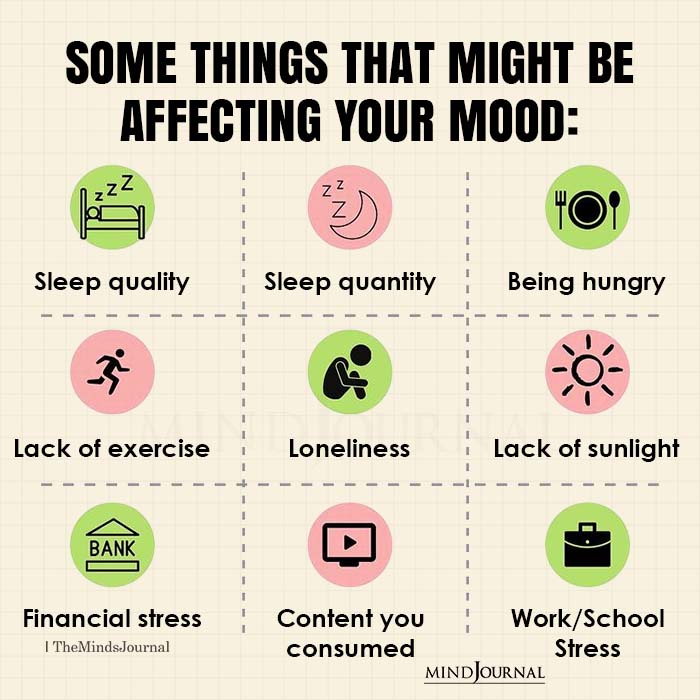Have you ever experienced sudden shifts in your emotions that seem to come out of nowhere? One moment you’re feeling on top of the world, and the next, you’re engulfed in a wave of sadness or irritability. Let’s learn how to deal with mood swings.
Mood swings are unpredictable changes in mood and they can have a significant impact on our daily lives and relationships. This is why it is crucial to learn strategies for dealing with mood swings.
What Are Mood Swings?
Mood swings refer to abrupt and intense shifts in a person’s emotional state, often transitioning between extreme highs (euphoria) and lows (depression).
These are significant and sometimes rapid fluctuations in a person’s emotional state. These shifts can encompass a wide range of emotions, such as happiness, sadness, irritability, and even anger.
Mood swings can vary in duration, from minutes to hours or days. They are not always related to external events and may occur seemingly without any apparent trigger. Factors contributing to mood swings can include –
- Hormonal changes
- Stress
- Sleep disturbances
- Medical conditions (e.g., bipolar disorder)
- Substance abuse
- Poor nutrition
- Certain medications
Mood swings can be particularly challenging for individuals who experience them regularly. They can impact relationships, work performance, and overall well-being.

Recognizing the underlying causes and seeking appropriate support, such as therapy or medical treatment, is essential for managing mood swings effectively and improving emotional stability.
Related: Gut Health and Mental Health: Understanding The Gut Brain Connection
How To Deal With Mood Swings
There are several helpful and effective strategies on dealing with mood swings. Let us consider the story of Jane, a working professional, who often struggles with mood swings and finds herself caught in a web of emotions that affect her personal and professional life.
Recognizing the need for change, she embarks on a journey of self-discovery, determined to regain control of her emotions. Here’s how Jane started coping with her mood swings and these tips can help you as well –
1. Prioritize Self-Care
Jane realizes that taking care of herself is paramount to managing her mood swings effectively. Incorporating self-care activities into her daily routine helps her cultivate a sense of calm and stability.
Here are some self-care practices that can work wonders for anyone dealing with mood swings:
a. Regular Exercise
Engaging in physical activities like jogging, yoga, or dancing releases endorphins, the “feel-good” hormones, which can uplift your mood.
b. Mindfulness and Meditation
Practicing mindfulness and meditation techniques helps Jane become more aware of her emotions and allows her to respond rather than react impulsively to triggers.
c. Sufficient Sleep
Establishing a consistent sleep schedule and ensuring an adequate amount of sleep can significantly impact mood stability.
2. Maintain a Balanced Diet
Diet plays a crucial role in managing mood swings. Jane discovers that certain foods can exacerbate her emotional rollercoaster, while others can promote balance and stability.
Here are some dietary tips she incorporates into her life:
a. Balanced Macronutrients
Consuming a well-rounded diet that includes lean proteins, healthy fats, and complex carbohydrates helps maintain stable blood sugar levels, which can positively affect mood.
b. Omega-3 Fatty Acids
Including foods rich in omega-3 fatty acids, such as fatty fish, chia seeds, and walnuts, can help reduce inflammation and improve overall brain health.
c. Limiting Stimulants
Jane learns that excessive caffeine, alcohol, and sugary foods can intensify mood swings. She moderates her intake and notices a significant improvement in her emotional well-being.
Related: Understanding The Difference Between Sadness and Depression
3. Seek Support
Jane realizes that she doesn’t have to face mood swings alone. Seeking support from loved ones or professionals can provide her with valuable insights, understanding, and guidance.
Here are a few avenues for support:
a. Trusted Friends and Family
Sharing her experiences with trusted individuals in her life helps Jane feel heard and understood. Their support and empathy provide comfort during difficult times.
b. Therapy and Counseling
Professional therapists or counselors can help Jane identify triggers, develop coping mechanisms, and explore underlying issues contributing to her mood swings. This is how to deal with mood swings.
c. Support Groups
Joining support groups or online communities allows Jane to connect with others who share similar experiences. Sharing stories and learning from each other’s strategies can be empowering.
4. Practice Emotional Regulation Techniques
To regain control over her emotions, Jane learns and implements various emotional regulation techniques. These strategies help her navigate through mood swings more effectively:
a. Journaling
Writing down her thoughts and emotions in a journal enables Jane to gain clarity and process her feelings. It serves as a valuable tool for self-reflection and helps her identify patterns or triggers.
b. Deep Breathing Exercises
Taking slow, deep breaths during moments of heightened emotions can activate the body’s relaxation response and help Jane regain emotional balance.
c. Distraction Techniques
Engaging in activities that shift focus away from negative emotions, such as listening to music, reading a book, or pursuing a hobby, can help Jane redirect her attention and stabilize her mood.

Takeaway
Dealing with mood swings can be a challenging and sometimes overwhelming experience. However, with a proactive and holistic approach like Jane’s, it is possible to find balance and inner harmony.
By following these techniques on how to deal with mood swings, anyone can navigate through mood swings more effectively and lead a more fulfilling life.
Remember, you are not alone in this journey. Embrace these strategies, adapt them to your unique circumstances, and discover the power within you to reclaim control over your emotions.
Together, let’s embark on a path of emotional well-being and find solace in the beauty of life.
Related: Feeling Down in the Dumps? 7 Things to Do About It
Frequently Asked Questions (FAQs):
What triggers mood swings?
Mood swings can be triggered by factors like hormonal changes, stress, sleep disturbances, medical conditions, substance abuse, and medication side effects.
How long do mood swings last for?
The duration of mood swings varies; they can last minutes to hours, days, or longer depending on causes and individual factors.
Are mood swings unhealthy?
Mood swings can be normal responses to life’s ups and downs but can be concerning if extreme, persistent, or disruptive to daily life.









Leave a Reply
You must be logged in to post a comment.